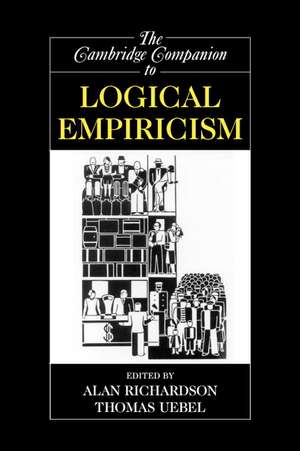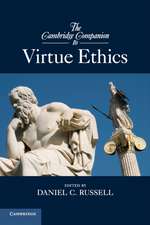The Cambridge Companion to Logical Empiricism: Cambridge Companions to Philosophy
Editat de Alan Richardson, Thomas Uebelen Limba Engleză Paperback – 2 sep 2007
| Toate formatele și edițiile | Preț | Express |
|---|---|---|
| Paperback (1) | 275.85 lei 6-8 săpt. | |
| Cambridge University Press – 2 sep 2007 | 275.85 lei 6-8 săpt. | |
| Hardback (1) | 645.26 lei 6-8 săpt. | |
| Cambridge University Press – 2 sep 2007 | 645.26 lei 6-8 săpt. |
Din seria Cambridge Companions to Philosophy
-
 Preț: 232.01 lei
Preț: 232.01 lei -
 Preț: 189.37 lei
Preț: 189.37 lei -
 Preț: 283.89 lei
Preț: 283.89 lei -
 Preț: 230.95 lei
Preț: 230.95 lei -
 Preț: 264.35 lei
Preț: 264.35 lei -
 Preț: 230.70 lei
Preț: 230.70 lei -
 Preț: 199.05 lei
Preț: 199.05 lei -
 Preț: 236.42 lei
Preț: 236.42 lei -
 Preț: 266.78 lei
Preț: 266.78 lei -
 Preț: 199.05 lei
Preț: 199.05 lei -
 Preț: 225.41 lei
Preț: 225.41 lei -
 Preț: 202.99 lei
Preț: 202.99 lei -
 Preț: 198.62 lei
Preț: 198.62 lei -
 Preț: 232.01 lei
Preț: 232.01 lei -
 Preț: 233.13 lei
Preț: 233.13 lei -
 Preț: 234.23 lei
Preț: 234.23 lei -
 Preț: 273.58 lei
Preț: 273.58 lei -
 Preț: 266.78 lei
Preț: 266.78 lei -
 Preț: 231.13 lei
Preț: 231.13 lei -
 Preț: 277.57 lei
Preț: 277.57 lei -
 Preț: 265.43 lei
Preț: 265.43 lei -
 Preț: 264.35 lei
Preț: 264.35 lei -
 Preț: 261.49 lei
Preț: 261.49 lei -
 Preț: 202.11 lei
Preț: 202.11 lei -
 Preț: 228.71 lei
Preț: 228.71 lei -
 Preț: 236.86 lei
Preț: 236.86 lei -
 Preț: 228.09 lei
Preț: 228.09 lei -
 Preț: 230.25 lei
Preț: 230.25 lei -
 Preț: 263.68 lei
Preț: 263.68 lei -
 Preț: 231.38 lei
Preț: 231.38 lei -
 Preț: 233.36 lei
Preț: 233.36 lei -
 Preț: 230.95 lei
Preț: 230.95 lei -
 Preț: 283.46 lei
Preț: 283.46 lei -
 Preț: 274.45 lei
Preț: 274.45 lei -
 Preț: 272.45 lei
Preț: 272.45 lei -
 Preț: 204.55 lei
Preț: 204.55 lei -
 Preț: 208.10 lei
Preț: 208.10 lei -
 Preț: 229.83 lei
Preț: 229.83 lei -
 Preț: 271.39 lei
Preț: 271.39 lei -
 Preț: 231.38 lei
Preț: 231.38 lei -
 Preț: 262.80 lei
Preț: 262.80 lei -
 Preț: 235.32 lei
Preț: 235.32 lei -
 Preț: 228.71 lei
Preț: 228.71 lei -
 Preț: 230.25 lei
Preț: 230.25 lei -
 Preț: 200.80 lei
Preț: 200.80 lei -
 Preț: 193.61 lei
Preț: 193.61 lei -
 Preț: 266.78 lei
Preț: 266.78 lei -
 Preț: 263.92 lei
Preț: 263.92 lei -
 Preț: 226.53 lei
Preț: 226.53 lei -
 Preț: 234.87 lei
Preț: 234.87 lei
Preț: 275.85 lei
Nou
Puncte Express: 414
Preț estimativ în valută:
52.78€ • 55.11$ • 43.69£
52.78€ • 55.11$ • 43.69£
Carte tipărită la comandă
Livrare economică 04-18 aprilie
Preluare comenzi: 021 569.72.76
Specificații
ISBN-13: 9780521796286
ISBN-10: 0521796288
Pagini: 446
Dimensiuni: 150 x 226 x 28 mm
Greutate: 0.59 kg
Ediția:New.
Editura: Cambridge University Press
Colecția Cambridge University Press
Seria Cambridge Companions to Philosophy
Locul publicării:New York, United States
ISBN-10: 0521796288
Pagini: 446
Dimensiuni: 150 x 226 x 28 mm
Greutate: 0.59 kg
Ediția:New.
Editura: Cambridge University Press
Colecția Cambridge University Press
Seria Cambridge Companions to Philosophy
Locul publicării:New York, United States
Cuprins
Introduction; Part I. The Historical Context of Logical Empiricsm: 1. The Vienna circle: context, profile, and development Friedrich Stadler; 2. The Berlin 'Society for Empirical/Scientific Philosophy' Dieter Hoffman; 3. From 'The Life of the Present' to the 'Icy Slopes of Logic': logical empiricism, the unity of science movement and the Cold War George Reisch; Part II. Logical Empiricism: Issues in General Philosophy of Science: 4. Coordination, constitution, and convention: the evolution of the a priori in logical empiricism Michael Friedman; 5. Confirmation, probability, and logical empiricism Maria Carla Galavotti; 6. The structure of scientific theories in logical empiricism Thomas Mormann; Part III. Logical Empiricism and the Philosophy of the Special Sciences: 7. The turning point and the revolution: philosophy of mathematics in logical empiricism from Tractatus to Logical Syntax Steve Awodey and A.W. Carus; 8. Logical empiricism and the philosophy of physics Thomas Ryckman; 9. Logical empiricism and the philosophy of psychology Gary L. Hardcastle; 10. Logical empiricism and the history and sociology of science Elisabeth Nemeth; 11. Philosophy of social science in early logical empiricism: the case of radical physicalism Thomas Uebel; Part IV. Logical Empiricism and Its Critics: 12. Wittgenstein, the Vienna circle, and physicalism: a reassessment David Stern; 13. Vienna, the city of Quine's dreams Richard Creath; 14. That sort of everyday image of logical positivism: Thomas Kuhn and the decline of logical empiricist philosophy of science Alan Richardson.
Descriere
This book shows how logical empiricism epitomized analytic philosophy in the middle of the twentieth century.













